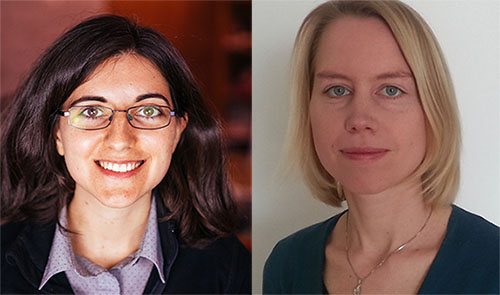
EECS Department Head Anantha Chandrakasan and Associate Heads Silvio Micali and David Perreault have announced the appointments of Tamara Broderick as the ITT Career Development Assistant Professor and of Stefanie Jegelka as the X-Consortium Career Development Assistant Professor. Both Broderick and Jegelka joined the MIT EECS Department in January, 2015. Read more about each below.
As a member of MIT's Computer Science and Artificial Intelligence Lab (CSAIL), Tamara Broderick focuses her research on developing and analyzing models for scalable, unsupervised machine learning using Bayesian nonparametrics. One side of her research demonstrates how to retain the strengths of the Bayesian paradigm (such as flexible modeling and coherent treatment of uncertainty) and nonparametric analysis while simultaneously enabling fast, and even streaming, inference on large data sets.
Much of unsupervised learning has focused on clustering, where the goal is to discover a collection of latent groups, called clusters, such that each data point belongs to exactly one such group. Tamara has developed theory and methodology for a variety of extensions to clustering. For instance, feature allocations allow data points to belong to multiple groups—an idea which more accurately captures that an individual might belong to multiple friend groups in a social network, a document in a corpus might be described by multiple themes, or a customer’s purchases might correspond to multiple interests.
Broderick completed her PhD in Statistics at the University of California, Berkeley in 2014. Previously, she received an AB in Mathematics from Princeton University (2007), a Master of Advanced Study for completion of Part III of the Mathematical Tripos from the University of Cambridge (2008), an MPhil by research in Physics from the University of Cambridge (2009), and an MS in Computer Science from the University of California, Berkeley (2013).
At Berkeley, Broderick was awarded the Evelyn Fix Memorial Medal and Citation (for the PhD Student on the Berkeley campus showing the greatest promise in statistical research), the Berkeley Fellowship, an NSF Graduate Research Fellowship, a Marshall Scholarship, and the Phi Beta Kappa Prize (for the graduating Princeton senior with the highest academic average).
Stefanie Jegelka, also a member of CSAIL, studied Computer Science (Bioinformatics) at the University of Tuebingen in Germany and at the University of Texas at Austin, and received a Diploma with distinction in 2007. In 2012, she received a PhD in Computer Science from ETH Zurich, in collaboration with the Max Planck Institute for Intelligent Systems and the University of Washington. From 2012 to 2014, she was a postdoctoral researcher in the EECS Department at the University of California Berkeley. In addition, she has been a research visitor at Microsoft Research Redmond, Georgetown University Medical Center and INRIA Paris.
Jegelka’s research interests lie in machine learning. Her work focuses on the computational challenges that arise from learning problems with complex variable interactions and discrete structure. In particular, her research has addressed scalable and parallelizable algorithms for discrete optimization problems in machine learning and computer vision, kernel methods, and the design of new models that exploit the mathematical structure of submodular set functions, a discrete analog of convex functions.
Stefanie has given several tutorials on Discrete Optimization and Submodular Functions in Machine Learning at conferences and summer schools, and has organized five workshops on the topic. Among other honors, she has been a fellow of the German National Academic Foundation, and has received a Best Paper Award at the International Conference on Machine Learning.
Date Posted:
Research Theme:
Labs:
Card Title Color:
Card Description:
Photo:
